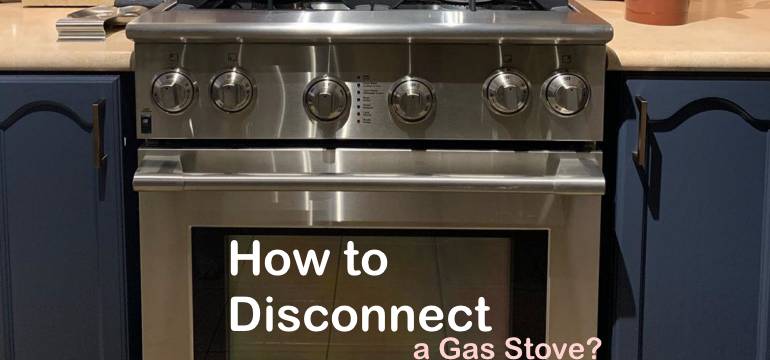If you have a gas stove, you may be wondering if you can unplug it. The answer is yes, you can unplug a gas stove, but you need to be careful. There are a few things you need to know before you unplug acgas stove.
First, make sure that the knob is in the “off” position. Next, open the windows and doors to ventilate the area. Finally, turn off the gas supply to the stove.
Once you have done these things, you can unplug a gas stove.
Many of us use gas stoves in our homes to cook delicious meals for ourselves and our families. But have you ever wondered if unplugging a gas stove is safe? In this article, we’ll explore this question and provide you with all the information you need to know to stay safe in your kitchen.
Understanding Gas Stoves:
Before we dive into whether it’s safe to unplug a gas stove, let’s first understand how these appliances work. Gas stoves rely on a constant supply of gas, typically natural gas or propane, to produce flames for cooking. The gas is delivered to the stove through a line connected to your home’s gas supply.
Components of a Gas Stove:
Gas stoves consist of several components that work together to produce heat for cooking. These components include:
- Burners: The burners are the part of the stove where the flames are produced. They are typically made of metal and can be turned on and off using knobs or buttons.
- Gas Valves: Gas valves control gas flow to the burners. When you turn on a burner, the gas valve opens to allow gas to flow to the burner, where it is ignited to produce a flame.
- Igniters: Igniters are responsible for lighting the gas from the burners. They can be either manual, using a lighter or match to ignite the gas, or automatic, where the stove has a built-in ignition system that creates a spark to ignite the gas.
- Gas Line: The gas line is the pipe that delivers gas from your home’s gas supply to the stove. It is typically made of metal and is connected to the stove via a flexible hose.
Is It Safe to Unplug a Gas Stove?
Now that we better understand how gas stoves work, let’s address the question: Is it safe to unplug a gas stove? The short answer is no; it is unsafe to unplug a gas stove while it is in use or when gas is still flowing to the appliance.

Reasons Why You Should Not Unplug a Gas Stove:
- Risk of Gas Leaks: Gas stoves rely on a constant supply of gas to produce flames for cooking. If you unplug a gas stove while it is in use or when there is still gas flowing to the appliance, you risk creating a gas leak. Gas leaks are extremely dangerous and can lead to fires, explosions, and carbon monoxide poisoning.
- Pilot Lights: Many gas stoves have pilot lights, which are small flames that burn continuously to ignite the gas when you turn on a burner. If you unplug a gas stove, the pilot lights may go out, causing the gas to build up and creating a potentially hazardous situation when the stove is plugged back in.
- Electrical Hazards: Gas stoves may have electrical components, such as igniters or control panels, that require power. Unplug a gas stove while it is in use may create electrical hazards, such as short circuits or electrical fires.
Safety Precautions for Gas Stoves:
While it is not safe to unplug a gas stove, there are some safety precautions you can take to reduce the risk of accidents and ensure the safe operation of your appliance:
- Follow Manufacturer’s Instructions: Always follow the manufacturer’s instructions for operating and maintaining your gas stove. It includes proper installation, usage, and maintenance procedures.
- Check for Gas Leaks: Regularly inspect your gas stove for any gas leaks, such as hissing sounds, unusual odors, or visible damage to the gas line or connectors. If you suspect a gas leak, immediately turn off the gas supply to the stove and contact a qualified technician.
- Keep the Area Ventilated: Ensure that your kitchen is well-ventilated when using your gas stove to prevent the buildup of gas fumes. Open windows or use exhaust fans to circulate fresh air and remove potentially harmful gases.
- Use a Carbon Monoxide Detector: Install a carbon monoxide detector in your home, especially near your gas stove, to alert you to any dangerous levels of carbon monoxide gas. Carbon monoxide is a colorless, odorless gas that can be produced by gas stoves and other fuel-burning appliances and is extremely toxic if inhaled.

Does a gas stove need to be plugged in?
No, a gas stove does not need to be plugged in. Gas stoves use natural gas, which is supplied to the home through a gas line. The gas is ignited by a pilot light or an electronic ignition, and the heat is controlled by a knob.
How do I disconnect my gas stove from gas?
If your gas stove is connected to a natural gas line, you will need to disconnect it before you can move the stove. Here are the steps you need to take:
1. Turn off the gas at the shut-off valve. The shut-off valve is usually located near the floor, behind the stove.
2. Disconnect the gas line from the stove. 3. Remove the stove from its location.
4. Once the stove is removed, you can cap the gas line using a gas line cap.
5. Reconnect the gas line to the stove if you plan on using it again.
Conclusion
If you want to unplug a gas stove, there are a few things you need to do first. Make sure that the stove is turned off and that all the gas valves are closed. Once you’ve done that, you can unplug a gas stove from the wall outlet.
Choosing a Gas Stove: Your Easy Guide to Picking the Right One. Learn how to find the best gas stove for your kitchen and cooking needs with our simple tips.
In conclusion, the safety of a gas stove is paramount to prevent potentially catastrophic accidents. Unplugging a gas stove while it’s in use or when gas is flowing poses significant risks, including gas leaks, pilot light outages, and electrical hazards. It’s crucial to adhere to the manufacturer’s instructions, regularly inspect for gas leaks, ensure proper ventilation, and install carbon monoxide detectors to mitigate risks associated with gas stoves.
By following these safety precautions and understanding the potential dangers, individuals can enjoy the convenience of cooking with gas while prioritizing the safety of themselves and their households. Remember, safety should always come first when dealing with gas appliances, and taking proactive measures can help prevent accidents and ensure peace of mind in the kitchen.
We hope you found this post interesting. If you want to see more of our content, you can visit our website Wehomedeco.com for more articles, tips, and resources. You can also follow us on social media to stay updated with our latest posts . We would love to connect with you and hear your feedback. Here are our social media links:





